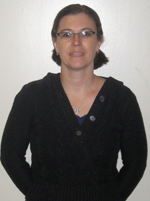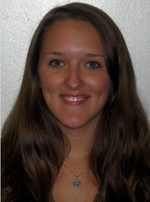Dr. Talinn Phillips, Assistant Professor of English Rhetoric & Composition, and graduate students Yavanna Brownlee, Stephanie Cheslock, and Elise Dixon present next month at the National Conference on Peer Tutoring in Writing in Tampa, FL.
Phillips is making a joint presentation on “Designing Support for Graduate Students” with Ohio University alum Dr. Lydia McDermott ’00, ’07 MA, ’12 Ph.D. McDermott earned three degrees in English and a Certificate in Women’s and Gender Studies from the College of Arts & Sciences and accepted a position as Assistant Professor at Whitman College in Walla Walla, WA.
“This roundtable explores how writing centers can design successful, targeted support services for graduate students,” Phillips says. “Discussion leaders will briefly share their experiences with developing a new Graduate Writing and Research Center. We’ll share logistics if participants are interested, but our focus is on two services designed specifically for graduate students: writing groups and quantitative methodology tutoring.
“We begin by discussing the role of peerness in graduate writing groups when the group is facilitated by an ABD or recent Ph.D. tutor. Drawing on Phillips (2012), we also highlight ways that we have found writing groups support multilingual writers. We advocate writing groups as an effective and efficient means of supporting all graduate writers through theses/dissertations.
“We then move to the most innovative feature of our new center, which is providing tutoring for quantitative methodologies and statistics. Though few other writing centers have defined ‘writing’ this broadly (see Snively), this has become a high-demand service that builds relationships early with writers in the beginning stages of the thesis/dissertation process. This was the riskiest component of our new center but has thus far been extremely effective and problem-free.”
Discussion questions include:
- What support does your university provide for graduate students?
- How does your writing center train students to work with graduate students?
- What successes have you had in your work with graduate students?
- What kinds of work have been unsuccessful?
- Do notions of “peerness” shift in graduate student contexts?
Brownlee, Cheslock and Dixon will present “Transcending Boundaries: Negotiating Distance and Space In and Out of the Writing Center.” Brownlee is a Ph.D. student and Dixon and Cheslock are in the master’s English Rhetoric & Composition program.
This panel explores how the writing center can be taken out of its traditional space and transformed to accommodate the needs of students. They will examine moving the tutor to the students in the residence hall, incorporating tutoring into distance education, and transcending Northian views of the center with digital spaces.
“This panel examines three negotiations of space and distance and argues that leaving the brick-and-mortar center can expand the circle of support for student writers,” according to their abstract. “Our first presentation examines a residence hall tutoring program and argues that bringing the center to the students where and when they write reaches a demographic not usually found in our center, athletes and first-year writers. This moves away from the static center space and makes it mobile, with sessions in dorms, at picnic tables, and even on buses, positively blurring the boundaries of students’ academic and social lives.
“Our second presentation advocates that centers address increasing numbers of distance learners, primarily in vastly rural areas. To include these students, tutoring should engage the telecommunity space while also using technologies such as Google Talk, Skype, and Google Drive to continue collaborative sessions with students who cannot be physically present in the center due to physical limitations and locations, creating a writing center session that transcends distance. (Wolfe; Neaderhaser; Griffin)
“We conclude in cyberspace, where our final panelist argues that North’s views of the collaborative non-clinical center have become conflated with physical face-to-face (f2f) tutoring. Literature suggests the value scholars attribute to digital spaces often concerns how similar that space is to f2f. This conflation can be damaging and limits the potential for writing center progress. For digital spaces to be productive additions to the writing center, scholars should consider how comparing digital spaces to the physicality of the traditional Northian writing center can be counterproductive.”
The graduate writing center is funded by a grant from Ohio University’s Konneker Fund for Learning and Discovery.





















Comments